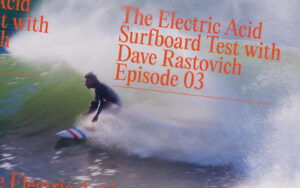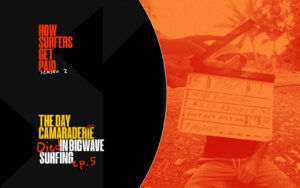Will California Legalize Magic Mushrooms, And What’s It Got To Do With Surfing?
There’s a Golden State movement pushing to decriminalize psilocybin mushrooms, and that could be a radical thing for our favorite pastime.
In Santa Cruz, advocates for psychoactive plants and fungi, such as psilocybin mushrooms, have told the local city council to stop tripping. A group called Decriminalize Santa Cruz is pushing the surf town to stop investigating and arresting people for possessing or cultivating plants with psychedelic properties
“The Santa Cruz community members supporting this resolution believe it is an inalienable right to develop our own relationship with nature, both as a measure of personal liberty and to embrace what it means to be human on Planet Earth,” read the agenda report coauthored by Vice Mayor Justin Cummings and Council members Drew Glover and Sandy Brown.
A U.S. Federal Schedule 1 substance, equivalent to heroin or methamphetamines in the eyes of the American government, psilocybin mushrooms and psychedelic substances have recently been getting a fresh look by the authorities. On the federal level, the U.S. Food and Drug Administration has just reclassified the mushrooms as a “Breakthrough Treatment” to help expedite research into the substance’s use for helping those suffering from depression.
In Oakland and Denver, psilocybin mushrooms have already been decriminalized. The organization Decriminalize Nature estimates that there are nearly 100 cities around the U.S. where the decriminalization effort is already underway in some way, shape or form. Along with Santa Cruz, Berkeley, Chicago, Portland, and Port Townsend, Washington, all have city council resolutions in process.
But the real bombshell news is that California Secretary of State Alex Padilla has cleared the way to start collecting signatures for a petition to decriminalize the mushrooms statewide.
The petition seeks to “decriminalize under state law the personal possession, storage, use, cultivation, manufacturing, giving away or furnishing for personal use, or consumption of psilocybin mushrooms and the hallucinogenic chemical compounds contained in them (including psilocybin and psilocin).”
Backers of the initiative have until May 2020 to gather over 620,000 signatures to make it onto the California ballot later in the year.
So, why is this surf news? A few reasons. First, California his home to one of most concentrated populations of surfers anywhere in the world. Second, for better or worse, surfing and psychedelics have a long, storied history. And just for good measure, one could make the case that more openness to psychedelic experiences could help usher in a new era in enlightenment in wave-riding. Remember, the shortboard is a direct result of the use of LSD.
Brotherhood of Eternal Love member and star of the original Endless Summer, Mike Hynson.
The story begins with the Brotherhood of Eternal Love in Laguna Beach in the mid to late 1960s. A group of surfers seeking to turn everyone on, they essentially became a surfing drug cartel. Producing the much-heralded Orange Sunshine acid, they essentially fueled the psychedelia if the ‘60s while enjoying some classic days at Brooks Street and beyond. Post Endless Summer, Mike Hynson fell in with the Brotherhood. Becoming affectionately referred to by some as the “pope of dope,” he was also the master of the downrail design, which allowed a certain Gerry Lopez to get in under the hood on those Lightning Bolts.
At some point, Dick Brewer got turned on and dropped out to Maui, where he started a surfboard label called Lahina Surf Designs—LSD. It was on Maui, at Honolua Bay, where the downrailed shortboard was perfected. (Nat Young, Bob McTavish, and George Greenough were also chasing the same feeling at the same time in Australia, but that’s another story.)
The greatest surf artist of the modern era, Rick Griffin, started his career drawing Murphy cartoons for John Severson in those original issues of Surfer magazine. Then came the acid. His talent blossomed as he became one of the most sought after poster artists in San Francisco’s Haight/Ashbury scene.
And in one of the most famous psychedelic surf stories, in 1969 Jock Sutherland was flying on a huge dose of acid when he surfed 20-foot Waimea alone…at night.
Rick Griffin’s original artwork for “Pacific Vibrations” on display at the Surfing Heritage and Culture Center in San Clemente.
That set the tone for the decades to come. There is story upon story of surf heroes dabbling in the spirit world, traveling with viles of liquid acid, picking shrooms in remote water buffalo fields in Indo, we won’t name names, but it happens way more than you’d imagine.
“Virtually all athletes who learn to use LSD at psycholytic dosages believe that the use of these compounds improves both their stamina and their abilities,” writes author James Oroc. “According to the combined reports of 40 years of use by the extreme sports underground, LSD can increase your reflex time to lightning speed, improve your balance to the point of perfection, increase your concentration until you experience ‘tunnel vision,’ and make you impervious to weakness or pain. LSD’s effects in these regards amongst the extreme-sport community are in fact legendary, universal, and without dispute.”
The current push for decriminalizing psilocybin mushrooms comes more from a therapeutic perspective, but that doesn’t mean it can’t have alternative benefits in the craft we ride and the way we approach waves. It’s believed to be helpful in treating depression, post-traumatic stress disorder, and other psychological issues. There are a growing number of highly visible personalities that have testified to their life-changing properties, including world champ boxer Mike Tyson and podcast host Joe Rogan.
In 2017, Kelly Slater visited the Rhythmia resort in Costa Rica where he had an experience with Ayahuasca—a drink made from Amazonian plants which contains DMT (dimethyltryptamine), the active ingredient in peyote. Traditionally, it’s been used in spiritual ceremonies among the Amazon’s indigenous tribes.
“I just had the most profound experience of my life,” testifies Slater in the YouTube video released by Rhythmia.
So, what happens next in California? The slow wheels of bureaucracy will continue to grind as grassroots moments continue to get organized. Remember, California was the first state to legalize medical cannabis back in 1996 and today it is commonplace around the world. Times change.














Comments
Comments are a Stab Premium feature. Gotta join to talk shop.
Already a member? Sign In
Want to join? Sign Up